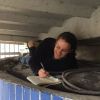
Harriet Peel
- Course: Robotics PhD
- PhD title: Robotic bridge bearing inspection
Harriet Peel is studying for a PhD in robotics, and spreads her time evenly between the Schools of Civil Engineering and Computing. Her project focuses on developing robotic bridge-inspection technology for Self Repairing Cities. It applies techniques from computing and robotics to the inspection of civil infrastructure.
Robotic technology that can inspect and repair infrastructure
Harriet described the topics she studies for her PhD in robotic technologies. She said:
“My PhD work focuses on the inspection of bridges, specifically the inspection of bridge bearings, which are the mechanical components of a bridge. Bridge bearings are critical to bridge performance and infrequent or inadequate inspection can lead to failure at large cost.
“To make bridge bearing inspection easier and more repeatable, I have focused on developing a robotic platform that uses low-cost, off-the-shelf technology with cameras to carry out visual inspection and other sensors for corrosion detection.”
Solving Grand Challenges through research
Harriet’s research has contributed to tackling grand challenges set by the Government to reach ‘zero disruption from street-works’ by 2050. Her work is part of the Self Repairing Cities project.
Harriet said: “My PhD is part of a larger project: an ESPRC Grand Challenge that aims to achieve zero disruption from road works in UK cities by 2050. In partnership with UCL and the Universities of Birmingham and Southampton, robots and other technologies are being developed for the inspection, monitoring and repair of cities.”
Choosing a research topic
Harriet explained she discovered the PhD project advertised online, and knew it was the right choice to apply for. She said:
“For me, it was important to choose a project which I found exciting and interesting, and that I could see myself working on for the next 3-4 years; that built on my engineering background, but also challenged me with new things to learn. I found that project here at Leeds.
“I would tell prospective students to not be afraid to try new things,” Harriet said.
“My undergraduate degree was in aeronautical engineering, and I continued to pursue a PhD in civil engineering and robotics. Remember that you have many transferable skills and your unique experience can provide a fresh perspective on many problems.
“Also, it’s important to take the time to prepare yourself and your work environment for taking on new tasks; some of the things that may seem trivial to learn can end up being the most useful.”
Facilities
Harriet explained that Leeds also has excellent research facilities, such as the ESPRC National Facility for Innovative Robotic Systems for fabricating complex systems. She said:
“I recently got the chance to utilise these facilities during the ESPRC National Intelligent Robotics Prototyping workshop, where we designed and built robots using the facility’s 3D printers over two weekends.
Postgraduate community
“During my time at Leeds, I’ve really enjoyed all the opportunities to interact with people from all over the world. Not just in the Schools of Civil Engineering and Computing, where we have a broad international community, but also through campus-wide networks.
“Such networks include Women at Leeds, Engineering outreach events; and even collaborating with researchers in Italy and at international conferences, which I have been lucky enough to attend in the USA and Taiwan.”
Future ambitions
Harriet explained she wants to continue carrying out her research after her studies.
“My future could be in either academia or industry,” Harriet said, “ but wherever I end up I hope to be working on projects that I enjoy.”
She added: “The future for robotics research is exciting and I hope I can make a lasting contribution.”

